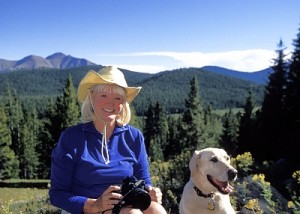Essay by Ray Ring
Environmentalism – June 2005 – Colorado Central Magazine
“Goofy logic” from “Ray Rong,” one critic charged. “The most ridiculous piece of journalism I have read,” said another. “Trash” and “rubbish,” said others.
Those blasts came from angry environmentalists. They’re criticizing a piece of news analysis I wrote recently, about an environmental-health disaster in Libby, Mont. I intended it to be provocative.
In that small town, more than a thousand people are either ill, dying or already dead, because they inhaled lethal asbestos fibers that spread from a nearby mine. Like many journalists who’ve looked into it, I blamed the corporate giant that ran the mine for decades, W.R. Grace & Co., along with the government agencies, industry agents, and others who allowed the town to get poisoned. But I also went further, concluding that environmentalists could have done more to help the asbestos victims.
The basic facts for that conclusion: The dangers of asbestos nationwide were known by the early 1980s. Then in 1985, Ralph Nader’s magazine, Public Citizen, reported that Libby workers, in particular, were ailing. Then in 1988, a leading Montana newspaper, the Missoulian, ran a front-page Sunday-edition story about Libby’s dying workers and widows filing lawsuits against the company. The mine closed in 1990, but the killer asbestos lingered in yards and houses all around the town. Yet environmentalists didn’t really hook up with the Libby victims until 1999.
Even then, environmentalists engaged the issue for only a few years. From 1999 to around 2002, they advocated for a pollution cleanup, and for medical care and compensation for the victims. Then they again shifted their focus to other issues, though the Libby victims continue to fight for their rights in Congress, the agency bureaucracies and the courts.
Any generalization is at least a little inaccurate. Environmentalists come in many stripes, and some are more concerned for communities than others are. But Montana’s environmentalists, like their fellows around the country, mostly concentrate on wilderness, wildlife and other aspects of nature; they oppose heavy- handed logging, dam-building and mining.
That’s part of what happened in Libby; environmentalists pressed many lawsuits over the industries’ impacts on nature outside the town. And in the process, environmentalists found themselves marooned on one side of a cultural divide, with industrial workers and their families on the other side. In Libby and nationally, voters have responded by supporting anti-environmentalist politicians.
In the feedback on my Libby piece, some environmentalists agree that their side should have done more for Libby and other communities. But I knew I would be jamming a stick into a hornet’s nest. Some of the criticism is well-reasoned, but there’s a certain strain that supports my conclusion.
“The environmentalists were not responsible for the mine, the criminal acts of its owners, the vitriol and hate hurled at them by the citizens of Libby, the distrust and divisions in the community,” said one environmentalist critic.
“Environmentalists can’t take care of everyone,” said another.
MUCH OF THE CRITICISM shows outright disdain for the workers and families. One letter-writer, the president of the board of a leading Montana group, calls Libby “an ignorant and arrogant community that actively and aggressively made it painfully clear that it wanted nothing ever to do with [environmentalists] and their creative efforts and factual information.”
Another said, “Mr. Ring would have had us drop all [our] work on behalf of all species and Creation, to help one small, hostile, pro-industry community intent on running us out of Dodge, even as they rushed blindly over an environmental cliff.”
Libby’s workers and their families, said another, are “a populace conditioned, on an integral, invisible, even molecular level towards escapism and simplicity.”
Stupid locals? Well, they’re human beings. They worked hard for generations, pulling ore from the mines and wood from the forests. They toughed it out, in difficult, risky jobs, and took pride. Perhaps they didn’t see as far ahead as they should have, but nobody’s perfect — even environmentalists.
One environmentalist in my town, who holds two master’s degrees from Yale University, approached me in a coffee shop to straighten me out. He said I’m confusing the role of “environmental activists” with the role of “community activists.” In his view, community activists focus on the workers and families, while environmentalists focus elsewhere.
That’s precisely my point: There should be no difference.
Ray Ring is a contributor to Writers on the Range, a service of High Country News in Paonia, Colorado (www.hcn.org). He is the paper’s reporter in the field in Bozeman, Montana.

